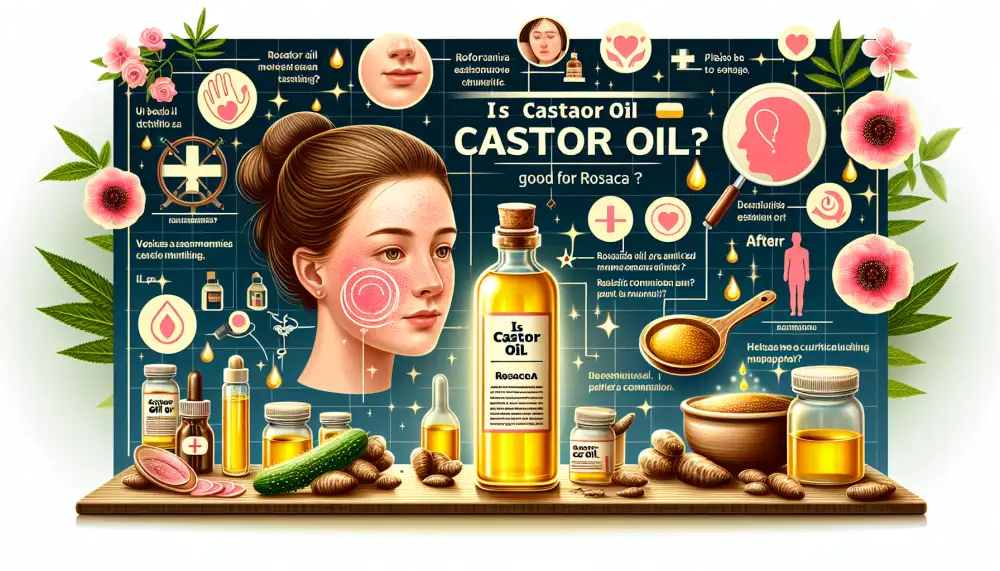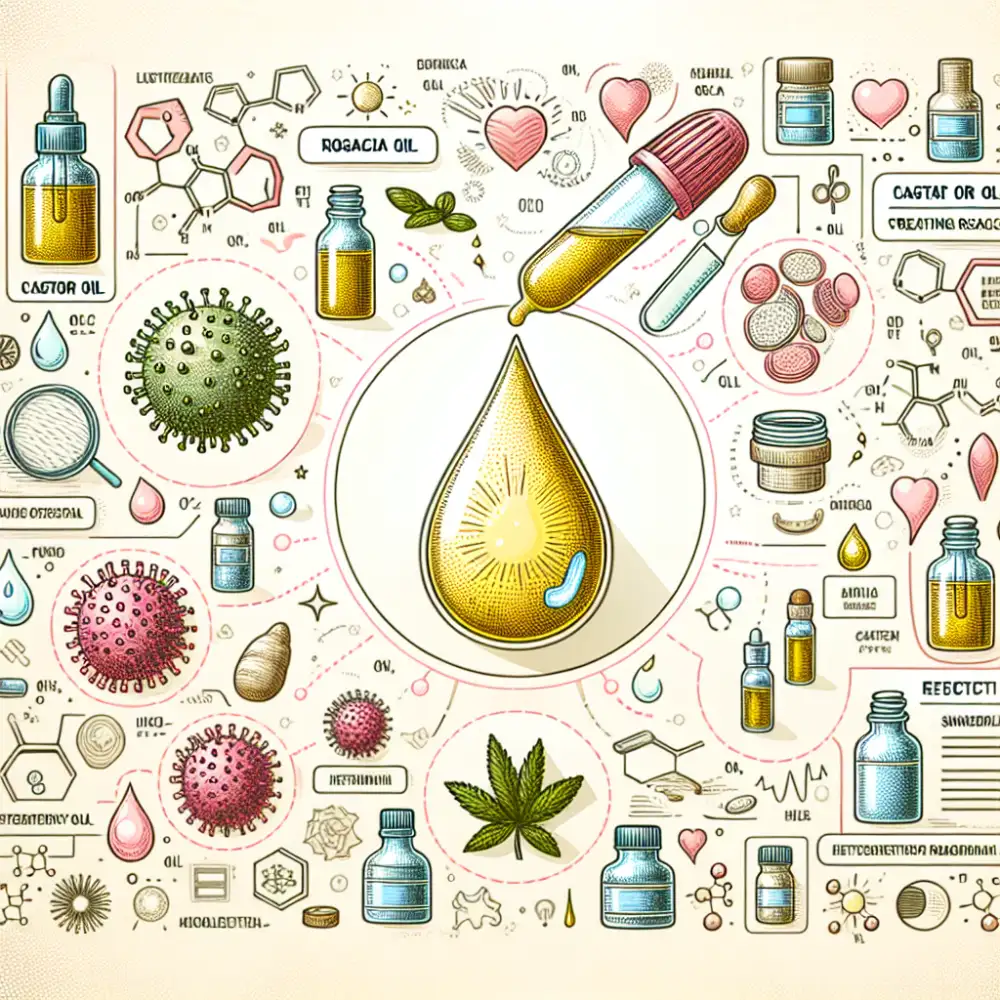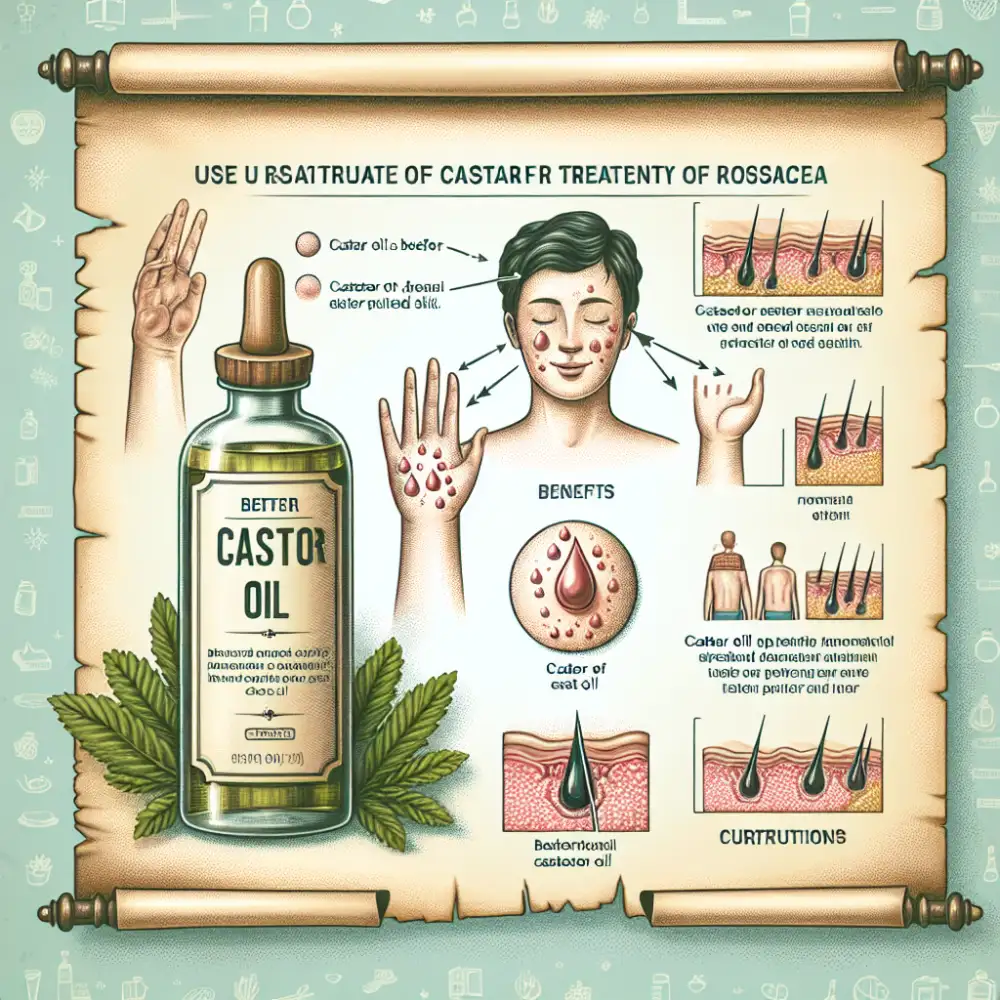Castor Oil for Rosacea: Miracle Cure or Recipe for Disaster?

Rosacea overview
Rosacea is a common skin condition that primarily affects the face. It's characterized by redness, visible blood vessels, and sometimes small, pus-filled bumps. While the exact cause of rosacea remains unknown, various factors can trigger flare-ups, including sun exposure, stress, spicy foods, and certain skincare products.
There's a growing interest in using natural remedies for managing rosacea symptoms, and castor oil is often mentioned as a potential option. Castor oil is a vegetable oil extracted from castor beans and is known for its anti-inflammatory and antimicrobial properties. These properties have made it a popular ingredient in traditional medicine and skincare.
However, when it comes to rosacea, the evidence supporting castor oil's effectiveness is limited and mostly anecdotal. While some individuals with rosacea report that applying castor oil topically helps soothe their skin and reduce redness, there's a lack of scientific studies to confirm these claims.
Moreover, it's essential to consider that castor oil is a very thick oil that can potentially clog pores, which might exacerbate rosacea symptoms in some individuals. It's crucial to perform a patch test before applying castor oil to your entire face, especially if you have sensitive skin.
If you're considering using castor oil for your rosacea, consult with a dermatologist or a qualified healthcare professional. They can assess your skin condition, provide personalized advice, and recommend evidence-based treatment options for managing your rosacea effectively.
Potential benefits
While castor oil enjoys popularity as a natural remedy for various skin concerns, there's limited scientific evidence to support its use for rosacea. Some people believe its anti-inflammatory and moisturizing properties might offer benefits, but more research is needed.
Castor oil contains ricinoleic acid, a fatty acid known for its anti-inflammatory effects. Inflammation plays a significant role in rosacea, so theoretically, ricinoleic acid could help soothe redness and bumps. However, no studies confirm its effectiveness specifically for rosacea.
The moisturizing nature of castor oil might appeal to individuals with rosacea, as keeping the skin hydrated is essential for managing the condition. Castor oil is a humectant, meaning it attracts moisture from the air and locks it into the skin. This property could potentially help strengthen the skin barrier and reduce water loss, which are often compromised in rosacea-prone skin.
Despite these potential benefits, it's crucial to remember that castor oil can clog pores for some individuals. Clogged pores can worsen rosacea symptoms, leading to increased inflammation and breakouts.
Furthermore, applying any new product to rosacea-prone skin comes with the risk of irritation or allergic reactions. It's always best to perform a patch test before using castor oil on your face, especially if you have sensitive skin.

Risks and side effects
While castor oil is generally considered safe for topical use, it's essential to be aware of potential risks and side effects, especially for sensitive skin conditions like rosacea.
Castor oil is a highly concentrated oil, and its thick consistency can clog pores, potentially exacerbating rosacea symptoms for some individuals. Clogged pores can trap dirt, oil, and bacteria, leading to increased inflammation, redness, and breakouts. This is particularly concerning for people with rosacea, as their skin is already prone to inflammation and redness.
Furthermore, castor oil's potency can cause skin irritation, burning, stinging, or itching, even in individuals without sensitive skin. If you experience any of these symptoms after applying castor oil, discontinue use immediately and consult a dermatologist.
It's crucial to perform a patch test before applying castor oil to your entire face, especially if you have rosacea or sensitive skin. Apply a small amount of castor oil to a discreet area of your skin, like the inside of your forearm, and wait 24 hours to observe any reactions. If you experience any irritation, redness, or discomfort, it's best to avoid using castor oil on your face.
Remember, what works for one person may not work for another, especially when it comes to sensitive skin conditions like rosacea. While some individuals may find castor oil beneficial, others may experience adverse reactions. It's always best to err on the side of caution and consult with a dermatologist before incorporating castor oil into your skincare routine, particularly if you have rosacea or other skin sensitivities.
Castor oil is not typically recommended for rosacea as it can be too occlusive and potentially clog pores, exacerbating symptoms for some individuals.
Dr. Evelyn Wright
Dermatologist recommendations
Castor oil is a popular natural remedy for various skin conditions, but its effectiveness for rosacea remains uncertain. Some people report that it helps soothe their symptoms, while others find it irritating.
Dermatologists generally don't recommend castor oil for rosacea. Here's why:
Lack of scientific evidence: There's limited research on castor oil's effects on rosacea. Most evidence is anecdotal, meaning it's based on personal experiences rather than scientific studies.
Potential for irritation: Castor oil is a thick oil that can clog pores and potentially worsen rosacea symptoms like pimples and redness.
Allergic reactions: While not common, some individuals may be allergic to castor oil, leading to skin irritation, itching, or redness.
What dermatologists recommend:

Instead of castor oil, dermatologists recommend sticking to gentle, non-comedogenic (won't clog pores) products specifically formulated for sensitive skin and rosacea.
Effective treatments for rosacea often include:
Topical medications: These may include creams or gels containing ingredients like metronidazole, azelaic acid, or ivermectin.
Oral antibiotics: In some cases, oral antibiotics may be prescribed to reduce inflammation.
Laser therapy: Certain laser treatments can help reduce redness and visible blood vessels.
Important note: It's crucial to consult a dermatologist for an accurate diagnosis and personalized treatment plan for rosacea. Self-treating can sometimes worsen the condition.
Published: 25. 06. 2024
Category: Food



